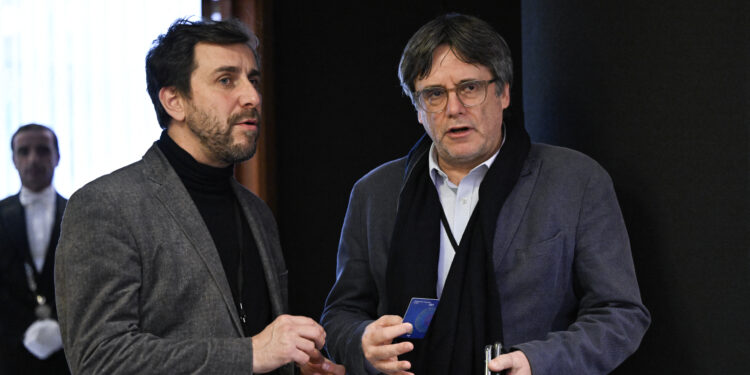Brussels – From the Court of Justice of the EU (CJEU) came this morning a new piece in the complicated judicial affair that has revolved for years around Carles Puigdemont and Antoni Comín, two Catalan independentists elected to the European Parliament in the last legislature. The judges of the Court, based in Luxembourg, upheld Thursday (Sept. 26) the ruling issued by the EU Court two years ago, which rejected the appeal filed by politicians from the autonomous Generalitat: essentially, the act by which the then President of the EU Parliament Antonio Tajani had refused to proclaim them as MEPs was valid and not challengeable before the European courts. But in the meantime, another CJEU ruling, after the events in question, could open the way for Comín to be confirmed in Strasbourg in the 10th legislature (inaugurated last July), which is currently frozen for the same reasons.
Let’s go in order. The piece added today (Sept. 26) by the CJEU adds to a complicated puzzle that needs to be pieced together from the beginning, starting with the European elections five years ago. On May 26, 2019, Spanish citizens elected, among their representatives to the Parliament in Strasbourg (54 then, increased to 59 after Brexit), the two Catalan independentists Carles Puigdemont and Antoni Comín. Three days later, on May 29, Antonio Tajani (then the outgoing President of the Parliament) issued an internal instruction recommending that no accreditation of any of the Spanish MEPs should be carried out until the official confirmation of their election had arrived from the country’s central electoral commission (Junta electoral central).
On June 13, the Junta had drawn up an initial official list of those elected, which included both Puigdemont and Comín, who, the next day, urged President Tajani to take note of their election and proceed with accreditation. This move would have allowed them to obtain the immunities associated with their status as MEPs, consequently sheltering them from the Spanish justice who wanted to arrest them because of the controversial referendum on Catalonia’s independence held in October 2017, when Puigdemont was President and Comín a member of the government of the autonomous Generalitat.
However, the names of both Catalan independence activists were missing from the list of elected officials officially communicated on June 17 by the Junta central to the Europarliamentary offices. The reason given by the Spanish authorities was that Puigdemont and Comín had failed to show up in Madrid to take the oath on the Constitution, an act that is indispensable for obtaining office as MEPs under the Spanish electoral law. Puigdemont and Comín had asked to be sworn in from Belgium, where they were in self-exile, but the request had been rejected.
Tajani thus informed the two in a letter dated June 27 that he could not consider them future MEPs because their names did not appear in the list of Spanish elected officials. The following day, Puigdemont and Comín appealed the then-president’s letter before the EU Court, demanding its annulment and claiming the regularity of their election in Strasbourg. In July 2022, the Court rejected the Independents’ appeal, arguing that it was inadmissible because the acts in question were not challengeable in light of EU law. Specifically, the judges explained that Tajani’s letter of June 27 did not produce binding legal effects because it was simply an acknowledgement of the decision of the Junta electoral (that, indeed, had produced legal effects).
Naturally, Puigdemont and Comín challenged these conclusions, appealing to the Court (representing the highest level of judgment in the EU). But it backfired because, with today’s ruling, the CJEU judges defended the decision taken by the Court two years ago, which “correctly stated that the President of the European Parliament could not deviate from the list of elected MEPs that had been officially notified to him by the Spanish authorities.”
The President of the Parliament, reads the press release issued by the Court, “has no competence to check the accuracy of that list, on pain of violating the division of competences between the Union and the Member States.” “Such a check,” it goes on to say, is not the responsibility of anyone within the Europarliament but rather “only of the national courts, where appropriate, after a preliminary reference to the Court, or of the latter, when hearing an action for failure to fulfil obligations.” Tajani, in short, behaved in the only way he could at the time.
At that time. At this point in the story, temporal clarification is necessary because an important thing happened between Tajani’s June 2019 letter and the Court’s July 2022 ruling. In December 2019, the Court issued another ruling regarding another Catalan independentist elected in that year’s Europeans: Oriol Junqueras Vies. Junqueras Vies had won one of Spain’s 54 seats by participating in the election from prison, where he had been imprisoned in November 2017 for the independence referendum.
In December 2019, the CJEU ruled that, in essence, a candidate for the European Parliament becomes an MEP (and can, therefore, benefit from immunities) with the proclamation of the results of the ballot box and that the Member States cannot invoke national rules as a justification for obstructing such an appointment. In compliance with that ruling, therefore, Puigdemont and Comín were accredited as MEPs in December 2019 and officially proclaimed in January 2020 (effective the previous July) by Tajani’s successor to the presidency of the hemicycle, David Sassoli.
Today’s ruling only says that the decision made at the time by Tajani was legitimate because the ruling on the Junqueras Vies case had not yet been formulated, and, therefore, the Court’s jurisprudence had not yet provided that precedent. But, today, that precedent exists, and therefore, Comín, who was re-elected this year and continues to find himself in the same situation as five years ago, should be able to obtain the proclamation as an MEP in this legislature as well, which Madrid continues to obstruct and which the current President of the EU Parliament, Roberta Metsola, has not formalised yet.
English version by the Translation Service of Withub





